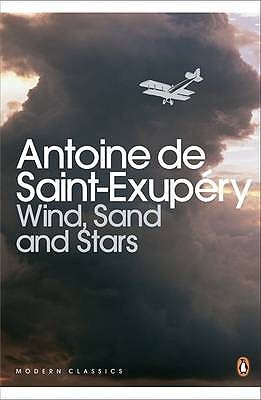Adventures in Bookland: Wind, Sand, and Stars by Antoine de Saint-Exupery

It’s not like any other flying book you’re likely to read. The Englishman in me is inclined to say that it’s very French, but then I stop myself: I am not English. Nor am I a pilot. But I have looked at the sky, I have flown in dream and watched, wide-eyed though gravity bound, the soar of red kites and the jagged sweeps of swifts. The contraction of flight, of we earth prisoners taking to the sky, to the tedium of modern commuter aviation is one of the greatest crimes against beauty that we have perpetrated in recent decades. Perhaps if planes, instead of the meagre portholes they provide, had windows like the great canopies that the pilots of fighter planes have, or glider pilots, then we would still have the wonder. But instead we look out on the world through a portal that looks like nothing so much as the door of a washing machine: a world of unexpected beauty reduced to a smeary spin cycle.
It’s perhaps just as well that Antone de Saint-Exupery never lived to see flight so reduced. He witnessed, and flew through, the romantic age of flying, opeing up new routes across South America and the Andes in planes that were little more than constructions of wood, wire and cloth. On one occasion, forced to land on a rocky plateau in the Sahara, he walks upon land that no human foot had ever trod before, its only means of access by air. He crashes in the desert, nearly dies, but continues to fly. It seems mad. But it reminds me of a friend of mine from university.
Yossi (his mother was reading Catch-22 during pregnancy) always dreamed of being a journalist. We got to know each other working on the student newspaper, where I also learned his ruthlessness, being roped in as an unwitting accomplice to the coup Yossi launched to unseat the newspaper’s editor. But while he was at university, Yossi caught the climbing bug too, and started dragging me up rock faces. For me, climbing was a retrospective pleasure, one I mainly enjoyed when I was no longer spread eagled on a rock face at an unfeasible height above the ground, but for Yossi it was more than that. Leaving university, Yossi started moving up the journalistic ladder, cutting his teeth at the Birmingham Post, with a move to Fleet Street all but certain. But then he fell off a mountain. Not just any mountain: Mont Blanc. In between writing stories, Yossi, with all the energy that a young man has to command, had been going off climbing and this time he was coming down Mont Blanc with a climbing friend, Mike Clarke, when they fell off.
The story made the press. They fell 3,000 feet down the side of the mountain, bouncing off rocks and snow on the way down, tumbling over crevices – Yossi’s helmet hit a rock so hard it shattered and he took a puncture wound from his ice axe that just missed a major artery – until they came came to a stop at the bottom. They should have been dead. Obviously. People don’t survive that sort of fall. But not only were they both still alive, but they were almost unscathed. Cuts and bruises: not even any broken bones.
Having brushed so close to death, Yossi took stock – and decided to give up his lifelong dream of being a journalist to become a full-time climber. He moved to South America, to Bolivia, working as a mountain guide while opening new routes up some of the least climbed mountains of the world. He was becoming the doyen of South American climbers. But then, towards the end of the climbing season, Yossi and his partner took two Americans up for a final climb. Yossi was roped to one of the clients, Dana Witzel, and his partner had the other. They were aiming for the summit of El Presidente, a 5,700-metre peak. No other mountaineer knew this peak and its surrounds as well as Yossi.
It was a small avalanche. A piddling little affair, a shifting of a few layers of snow. The other two climbers saw it and got to Yossi and Dana within minutes but they were too late. Yossi and Dana were both dead.
Yossi would have understood Antoine de Saint-Exupery perfectly although he would never have written like the Frenchman. But some things make so much of life that should death demand his due, he will be happily paid.
0 Comments